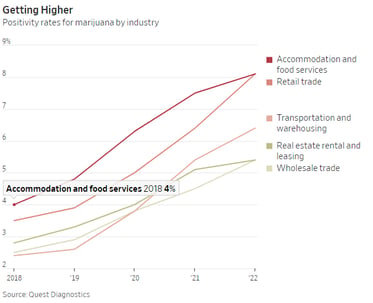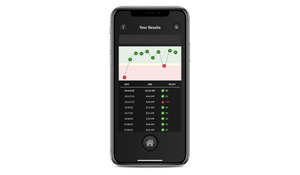As marijuana use becomes more common among Americans, companies are changing how they handle drug testing at work. Instead of relying on tests, many are training managers to spot signs of impairment and determine appropriate actions.
Some companies do not even consider being high at work to be a fireable offense and advise managers to approach workers with sensitivity.
This is a very difficult task.
A recent article in the Wall Street Journal outlines the struggles companies are facing when it comes to Marijuana use and the difficulties of detecting impairment within the workplace.
Here are the highlights of the article:
More Americans are using marijuana
- One in six American adults now says they smoke marijuana, a share that has eclipsed the number of cigarette smokers, according to recent Gallup data, and expanding legalization of the drug has led more companies to scrap employee drug-testing.
- Data from Quest Diagnostics, one of the country’s largest drug-testing laboratories, shows a rise in worker marijuana use, too. Among the six million general workforce tests it conducted for marijuana last year, 4.3% came back positive, the highest rate in nearly three decades.
- In drug tests given to workers after accidents on the job, marijuana positive test rates have tripled over the past decade, according to Quest.

Managers are tasked with detecting signs of impairment in the workplace
- Companies are leaning on managers to spot signs that workers are impaired on the job and determine what to do when they are.
- “Managers are really on the front lines of making these determinations, and it’s very difficult to do.”
- Approaching workers who appear under the influence is a delicate proposition, says Lisa Ahart, senior vice president of U.S. human resources for Toray Industries America, a synthetic fibers, textiles and chemicals manufacturer. Toray employs 3,000 people in nine states with varying laws on marijuana use.
Companies Cannot Find Enough People To Hire
- Companies face challenges finding enough people to hire, and drug screening makes that even harder, says Natasha Jones, director of operations at HD Screening and Laboratory in Lithia Springs, Ga.
How should employers navigate marijuana use by workers?
- Eric Waxman, human-resources director for CRP Industries, an automotive-parts supplier and distributor employing 180 workers in New Jersey and South Carolina, says his company bans drug impairment at work. Waxman notes there are other ways someone can be impaired on the job, such as a lack of sleep.
- “If you come into work tired and you’re driving a lift or cherry picker, you’ll also be impaired,” he says. “It seems a little hypocritical to pick out a few things that could cause impairment and ignore the rest of them.”
Cognitive Impairment Testing To The Rescue
Here at Predictive Safety, we address these challenges everyday. With managers being tasked to detect impairment, there are too many factors that come into play which makes this responsibility ineffective. In addition to factors that could alter their perception (age, race, gender, appearance, etc) it’s nearly impossible to get eyes on every worker, every day to assess impairment. All these factors and more create a nightmare for management and human resources.
Companies need effective tools to support their managers so they can engage with their workforce in a non-biased, objective manner.
That is why The AlertMeter® is such an important asset for companies. It gives management an effective tool to take the guesswork out of manager-employee engagement.
When someone tests ‘outside normal range’ it triggers a safety conversation that otherwise might now have happened. Since The AlertMeter® is based on an individual's personal baseline, it is unbiased and only detects impairment (non specific) which allows managers to engage with their employees without assuming they are “high”.
Then, depending on how that conversation proceeds, (slurred speech, balance issues, etc.) reasonable suspicion training can come into effect. But it also is very supportive for those who are not impaired by drugs/alcohol and could be affected by lack of sleep or emotional distress.
Our client, Triple S Steel, addressed these challenges last year at the New Jersey Business & Industry Association meeting. Here is a 15- minute video from their VP of Safety discussing how they utilize The AlertMeter® to face the challenge of legal marijuana.
No matter the impairment, The AlertMeter® reduces company’s risk significantly and supports management in the difficult task they are given of identifying impairment in the workplace.



